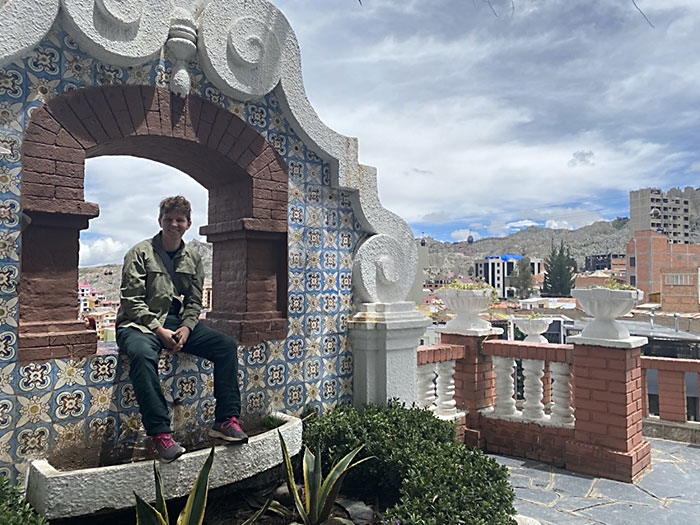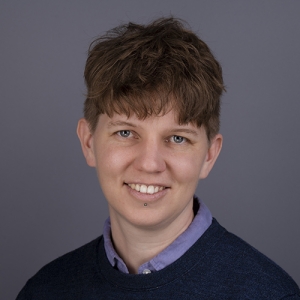Since arriving at Union the fall of 2020, Elena McGrath has quickly become one of the College’s most popular professors.
In recent surveys of top students at Union, the valedictorians and salutatorians have often cited classes taught by McGrath as among their favorites.
It’s all in a day’s work for McGrath, assistant professor of history and Latin American and Caribbean Studies.
McGrath teaches classes on Latin American history from the colonial era to the present.
Her research focuses on communities fighting for revolution in the Andes across the 19th and 20th centuries. Her first book, “The Limits of Revolution: Worker Citizens in a Bolivian Mining City” (forthcoming from University of Texas Press, 2026), tells a rank-and-file history of the 1952 Bolivian National Revolution from the perspective of the men, women and children in a small copper mining city called Corocoro.
A recent article, “(Un)cooperative Labor? Mining Cooperatives and the State in Bolivia,” published in the Bolivian Studies Journal, traces the roots of contemporary political crises to longstanding competition between populations of miners after the 1952 revolution.
She is currently working on a paper on Carnival traditions and the links between festivity and protest in Andean cities. Her next project will investigate the circuits of trade, migration and transport that bound Bolivians to a piece of cultural patrimony that no longer exists—the lost Pacific coastline—to illuminate the construction of national belonging through loss, exclusion, and the transgression of borders.
McGrath has written for academic blogs such as Notches: (re)marks on the history of sexuality, Nursing Clio, and Age of Revolutions, and is one of the co-hosts of the podcast, “New Books in Latin American Studies.”
Outside the classroom, McGrath is co-advisor of the Ceramics Club. She likes to explore upstate New York with her wife, Kate, and her dog, Skittles, which she describes as a mutt of strange proportions: a big dog on little dog legs.
Since coming to Union, she has learned to play the bass drum (also known as a surdo) and performs in a local batería (samba drumming group), called Troy Samba. She is also one of the founding members of Schenectady-based community choir, The Pitch Pines.
For 2025-2028, McGrath will serve as assistant dean and New York Six Mellon Fellow in the Dean of Studies office.
Born in Sonora, Calif. (in the Sierra Nevada mountains) and raised in Colorado, McGrath calls Schenectady her home now.
FIRST APP YOU LOOK AT IN THE MORNING: Signal, because I have friends and family in different time zones and sometimes, I wake up to nice messages.
WHAT ARE YOU READING? I read so much for work that sometimes I have to give my eyes a rest, and I love audiobooks for this purpose. I am listening to “Bury My Bones in the Midnight Soil” by VE Schwab, which is historical fiction about vampires, and I just finished “Neon Roses” by Rachel Dawson, which is set during the miners’ strike in Wales in the 1980s and features members of Lesbians and Gays Support the Miners, a group that may be familiar to anyone who has seen the 2014 movie “Pride.” I am also reading “Everyone Who is Gone is Here: The US, Central America, and the Making of a Crisis” by Jonathan Blitzer because I have to balance reading hard things and fun things.
WHAT ARE YOU WATCHING: “Sinners.” You want a great movie with a great soundtrack and some seasonal scary vibes mixed in with your history? Yeah, you do.
BEST PIECE OF ADVICE YOU RECEIVED: You should make a regular practice of trying things that you aren’t very good at, and applying yourself to practicing them anyway. You will probably eventually get good at them, but the process of being bad at something while slowly getting better is so good for your brain.
ONE SKILL YOU WISH YOU HAD: Sight reading music. Or carpentry. Both seem like very useful skills for the world.
THREE DINNER PARTY GUESTS (living or deceased): What is a dinner party without storytelling? I want to invite three guests who would keep me entertained while being curious about each other and the world. I would invite James Baldwin, one of the great raconteurs of the twentieth century and also just such a creative, incisive observer of our world. A good dinner party should also come with a little bit of provocation, so I would also invite Maria Galindo, one of the founders of the Bolivian anarcha-feminist collective Mujeres Creando. I hope she would come, but she might refuse the invitation. Finally, I think you need someone with grand dame host energy to be there, and since I do not have it, I would invite Jinkx Monsoon to preside over the night. She is a very talented entertainer but also very good at reading people and can project venerable host better than anyone. Put these three in a room? An incredible evening.
LITTLE KNOWN FACT ABOUT YOU: Aside from the drumming? I am a very good transnational breakfast chef. I can make both British and American-style pancakes with great facility.
FAVORITE UNION MEMORY/EXPERIENCE: Getting to see the seniors graduate last year. These are students that I have had the pleasure of teaching as first years, sophomores, juniors and seniors, and to see them launch into the world as confident, awesome graduates? The best feeling.
ONE THING YOU CAN'T LIVE WITHOUT: Coffee. Or rather, I can, but why would I?
WHICH LIVING PERSON DO YOU MOST ADMIRE: I think that we, as a society, like to anoint heroes and then watch them fall off their pedestals. It’s too much for a single person to bear. Anyone who gets up in the morning hoping to make their community better and puts in the work to do it, every single day? That’s who I admire.

